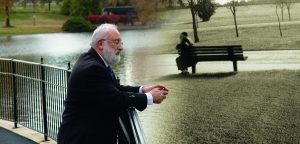
On a cold and rainy evening in February 1979, as I and Chaim Malka, my study partner of several years back then, were about to start studying our usual ancient Kabbalah books, I suddenly got tired of the endless and seemingly futile search for the truth. “Let’s go look for a teacher,” I said to Chaim. “Where would we go?” he asked. “Let’s drive to Bnei Brak,” I replied, “we’ve never looked there.” Chaim wasn’t keen on driving in this weather, much less to a Jewish Orthodox crowded city with narrow, semi-paved roads, and where kabbalists were unlikely to be found. I urged him nonetheless and he, reluctantly, agreed.
When we got to Bnei Brak, late that evening, there was no one on the streets. They were empty, wet, and cold. At a crossroads, I suddenly spotted a man about to cross the street. Hurriedly, I lowered the window pane and hollered toward him: “Where do they study Kabbalah around here?”
It was a very unusual question. In those days, no one spoke about Kabbalah, and among Orthodox Jews, the topic was a taboo. Even more unusual was the man’s response: He looked at me calmly and replied straight away, as if he had been waiting for me to come and ask him just that. “Turn right, go all the way down to the end of the road where the orchard begins,” he said. “To your left, you’ll see a house. That’s where they study Kabbalah,” he concluded and went on his way.
We drove as the man instructed, and indeed, the house was there. We got out of the car, and knocked on the door but no one answered. The house was nearly all dark. We tried the door and it was unlocked. We went inside and there was no one there except for one room that was lit and voices came from in there. We walked in hesitantly and found five or six elderly men reading in The Zohar and murmuring words in a language I did not understand (it was Yiddish). The elder gestured to us to take a seat, and we sat silently next to the men, on the benches around the old, wooden table where the men were studying.
The elder among them, who invited us to join them and was clearly the teacher, turned out to be Rav Baruch Shalom Ashlag (RABASH), the firstborn son and successor of Rav Yehuda Ashlag (Baal HaSulam), the greatest kabbalist in the 20th century and author of the acclaimed Sulam [Ladder] commentary on The Book of Zohar. Finally, after years of searching, I had found my teacher.
For the next twelve years, until his final breath, I stayed with RABASH, assisting him in everything I could, and learning from him all that he could give, and he had given me more than I could ever have imagined anyone could give. Thirty years ago today, he passed away in my arms, leaving me his notebook where he wrote all that he had learned from his giant father, and with a legacy: to tell the world about the true meaning of this great wisdom, and show them a path of light in a dim present and a foreboding future.
I wrote my first three books under the guidance of RABASH. Following his passing, I wrote another book, and people began to come to me in search of a teacher. I had no desire to teach. I wanted to seclude myself with the books and the wisdom I had learned from RABASH. But they insisted on coming and I realized that the times were changing and the doors to the wisdom of Kabbalah were opening.
Together with my first students, we established the first study group, and Bnei Baruch [Sons of Baruch], a group of students who strive to walk in the footsteps of my teacher, and of all the kabbalists before him, came to be.
Thirty years later, Bnei Baruch is no longer a group. Today, it is a worldwide movement that strives to help the world unite in love above all differences. Thanks to my students, the teachings of RABASH are learned and loved throughout the world. These students are fulfilling my teacher’s dream. Therefore, today I am confident that with the help of my teacher, and the dedication of my students and friends, the teachings of the man of light, whose love radiated from his every word, will spread far and wide, and illuminate our lives.
#Rabash #kabbalah #spirituality
Posted on Facebook, LinkedIn, The Times of Israel